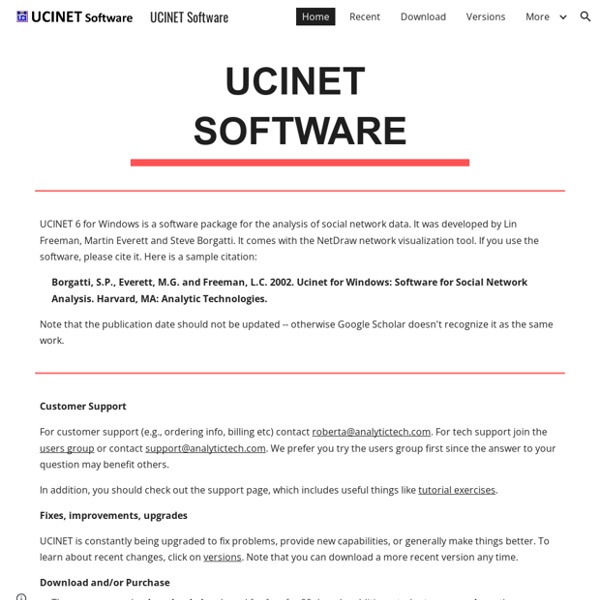



https://sites.google.com/site/ucinetsoftware/home
Related: Research & EpistemologyTrump: Los “hechos alternativos” nacen de nuestros prejuicios Tras el proyecto de peatonalizar la Gran Vía se dice que el centro de todas las capitales está cerrado al tráfico y no es verdad Coincidiendo con la elección y el recién inaugurado mandato de Trump se ha puesto de moda criticar la aparición de noticias falsas, lo que muchos llaman “post-verdad”, como si las mentiras de toda la vida fuesen una novedad inédita. Una novedad, además, que hubiesen impulsado desde la sombra un contubernio de oligarcas, por supuesto neoconservadores. No obstante, a poco que nos detengamos a pensar en la cantidad de mantras de todo signo que se publican a diario, acaso los analistas más críticos deberían de reflexionar si ellos mismos no están contribuyendo a alimentar la emergencia de “hechos alternativos”.
NetLogo Home Page NetLogo is a multi-agent programmable modeling environment. It is used by many tens of thousands of students, teachers and researchers worldwide. It also powers HubNet participatory simulations. It is authored by Uri Wilensky and developed at the CCL. You can download it free of charge. You can also try it online through NetLogo Web. Post-truth politics - Wikipedia Political culture where facts are considered of low relevance Post-truth politics (also called post-factual politics[1] and post-reality politics)[2] is a political culture in which debate is framed largely by appeals to emotion disconnected from the details of policy, and by the repeated assertion of talking points to which factual rebuttals are ignored. Post-truth differs from traditional contesting and falsifying of facts by relegating facts and expert opinions to be of secondary importance relative to appeal to emotion. While this has been described as a contemporary problem, some observers have described it as a long-standing part of political life that was less notable before the advent of the Internet and related social changes. As of 2018[update], political commentators have identified post-truth politics as ascendant in many nations, notably Australia, Brazil, China, India, Russia, the United Kingdom, and the United States, among others.
SoNIA - Social Network Image Animator Social Network Image Animator What is it? SoNIA is a Java-based package for visualizing dynamic or longitudinal "network" data. By dynamic, we mean that in addition to information about the relations (ties) between various entities (actors, nodes) there is also information about when these relations occur, or at least the relative order in which they occur. Our intention for SoNIA is to read-in dynamic network information from various formats, aid the user in constructing "meaningful" layouts, and export the resulting images or "movies" of the network, along with information about the techniques and parameter settings used to construct the layouts, and some form of statistic indicating the "accuracy" or degree of distortion present in the layout.
Five reasons why Macron won the French election Image copyright AFP Emmanuel Macron has triggered a political earthquake in French politics. A year ago, he was a member of the government of one the most unpopular French presidents in history. Now, at 39, he has won France's presidential election, defeating first the mainstream centre left and centre right and now the far right as well. He got lucky No doubt about it, Mr Macron was carried to victory in part by the winds of fortune. Journal of Artificial Societies and Social Simulation Modelling Research Policy: Ex-Ante Evaluation of Complex Policy Instruments Petra Ahrweiler, Michel Schilperoord, Andreas Pyka and Nigel Gilbert The Complexities of Agent-Based Modeling Output Analysis Ju-Sung Lee, Tatiana Filatova, Arika Ligmann-Zielinska, Behrooz Hassani-Mahmooei, Forrest Stonedahl, Iris Lorscheid, Alexey Voinov, Gary Polhill, Zhanli Sun and Dawn C. Parker Transitions Between Homophilic and Heterophilic Modes of Cooperation Genki Ichinose, Masaya Saito, Hiroki Sayama and Hugues Bersini "Anarchy" Reigns: A Quantitative Analysis of Agent-Based Modelling Publication Practices in JASSS, 2001-2012 Simon D Angus and Behrooz Hassani-Mahmooei High Standards Enhance Inequality in Idealized Labor Markets Károly Takács and Flaminio Squazzoni
Así firmaron Obama y Trump en el Museo del Holocausto en Israel “Es un gran honor estar aquí con todos mis amigos — ¡qué increíble, nunca lo olvidaré!”, escribió Donald Trump en Yad Vashem, el Museo del Holocausto en Jerusalén, este martes. Su mensaje cumple con la tradición de otros presidentes estadounidenses de dejar unas palabras en el libro de los recuerdos del museo. Pero contrasta con lo elaborado y solemne de su predecesor. NodeXL: Network Overview, Discovery and Exploration for Excel - Home
Por qué revistas como ‘Nature’, ‘Science’ y ‘Cell’ hacen daño a la ciencia Soy científico. El mío es un mundo profesional en el que se logran grandes cosas para la humanidad. Pero está desfigurado por unos incentivos inadecuados. “Morir es un alivio”: 33 exnarcos explican por qué fracasa la guerra contra la droga Soy del norte de México, una de las regiones más afectadas por la violencia del narco durante la guerra contra el narcotráfico. Entre 2008-2012 mi ciudad vivió una de las épocas más inciertas y violentas en su historia. Las balaceras, enfrentamientos entre cárteles y militares, que empezaron como acontecimientos esporádicos, terminaron siendo eventos frecuentes. Sucedían a plena luz del día y en cualquier lugar de la ciudad.
Facebook and the Surveillance Society: The Other Coup This past year of pandemic misery and Trumpist autocracy magnified the effects of the epistemic coup, revealing the murderous potential of antisocial media long before Jan. 6. Will the growing recognition of this other coup and its threats to democratic societies finally force us to reckon with the inconvenient truth that has loomed over the last two decades? We may have democracy, or we may have surveillance society, but we cannot have both. A democratic surveillance society is an existential and political impossibility.